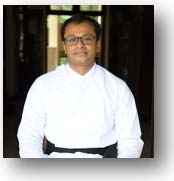Vicars Message - St. Paul's Church, Kandy
Main menu:
- Home Page
- About Us
- Mission Priorities
- News
- Parish Activities
- Special Events
- Picture Gallery
- Contact Us
Monthly message…… - St. Paul's Church, Kandy
News letter – April 2025 ………………
From the Vicar’s desk…..

Dear Sisters and Brothers,
We continue our journey in Lent, as we enter
April this year.
Most of us may be having fruitful observations of Lent and others might not have as
much fruitful observations. The good news is
that there is still almost half of the season left
to make a commitment to our Lord as we follow Jesus in heart and mind in
Jesus' journey of ministry, suffering, death and the resurrection.
And as we come to Palm Sunday and the Holy Week, which some might call as
the ' business end' of the season, our churches tend to ritualize with many
traditional services that makes this journey even more realistic.
At St Paul's, we continue observations throughout the week and ask your
continued participation in these as a church family.
And then onto the Easter Tridium starting from Maundy Thursday till Holy
Saturday the events of centrality to our faith come into focus. The Holy Saturday
eve service marks Easter with a beautiful rendition of ritual, lessons and light
symbolizing our passing from darkness to light, fear to trust and death to life.
The high point of Easter is really an 'uplifting' we all must experience and carry
forward in our faith and secular journeys. We need to rise above the worldly as
we saw in the temptations and set our minds on the heavenly. We must rise in
our spiritual behavior as we would have endeavored to better ourselves through
disciplining in Lent. We must aim to rise above division, hate and envy as we
now grasp Jesus as the Lord of life and of all that nurtures life.
Let us seek God's empowerment continually as we bring this season into
fruition.
Revd. Rasika Abeysinghe - Vicar
Message for the Environment Day
Bishops of the Church of Ceylon

(05th June, 2021 | 06.00 )
This year’s theme for World Environment Day is Reimagine, Recreate and Restore and given the crisis that the world faces with respect to climate change, 2021 also marks the launch of the United Nations Decade on ecosystem restoration (2021-2030). The Church of Ceylon calls upon all Sri Lankans to join with the peoples of the world to focus the attention of governments, leaders of all faith communities, business communities and civil society, on the urgent need to heal and restore the earth’s ecosystems.
Sacrificing the care of the environment in the pursuit of human development is depleting and stretching the earth’s natural resources to the maximum. As a result, dramatic changes in climate, pollution, poverty, deprivation and sickness are on the rise; nature cannot endure the abuse and over-exploitation. As Christians, we believe that God gave us shared dominion of the earth with the task of not only using it for sustenance but also to nurture it and manage it responsibly for the benefit of all, including future generations. It is important to note that the creation story in the Bible teaches us that even God rested after six days of work; the principles of the sabbath and the jubilee remind us that the earth and the soil need rest, restoration and rejuvenation. Many religious traditions and the wisdom of first peoples contain similar insights.
We salute youth leaders in various parts of the world who are leading the campaign through education, advocacy and even litigation in courts, to ensure that the world recognizes its responsibility of stewardship and management of the planet.
Major environmental problems in the world, deforestation, the lack of clean water and air, the loss of biodiversity, droughts and floods, increased sicknesses are the result of human beings abusing nature. In most of these situations, it is the poor and the vulnerable that suffer the most. This is unjust and unacceptable to us as Christians as Jesus Christ always was particularly concerned about the poor, the marginalized and the excluded.
In our own country, we have witnessed in recent years a failure in these responsibilities of stewardship. The pollution of the soil, waterways, and the sea, unsustainable soil and mineral mining and denudation of the natural tropical forest cover are a few examples. Policies for development must take cognizance of their impact on the environment. We need to review our economic and development policies and models, our modes of living and consumption and personal lifestyles so as to ensure that we shift to 'greener' methods of economic activity and living. Let us live in harmony with Mother Nature rather than destroying her; let us think not only about ourselves but also those yet to be born. We can start by cutting down on consumption and ‘wants’ and reducing, reusing and recycling waste and conserving water and energy. We can start with ourselves, our homes, churches, and work places.

The Rt Revd Keerthisiri Fernando, Bishop of Kurunagala & The Presiding Bishop of the Church of Ceylon

The Rt Revd Dushantha Rodrigo, Bishop of Colombo
Click to read full Message with Sinhala and Tamil translations